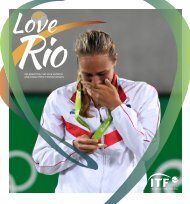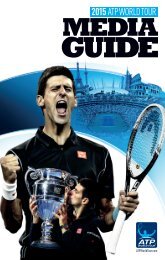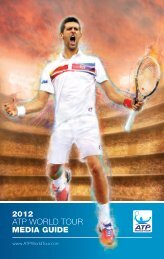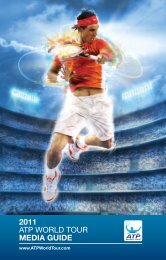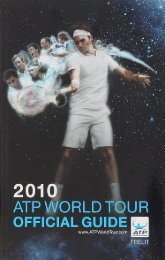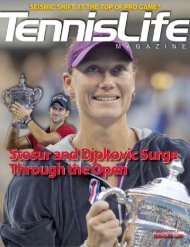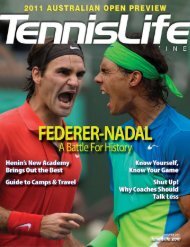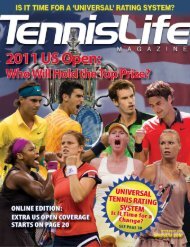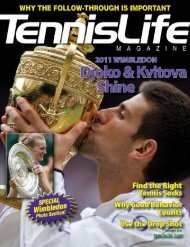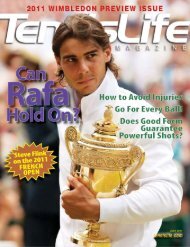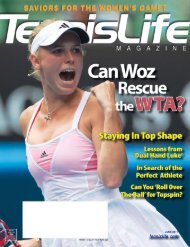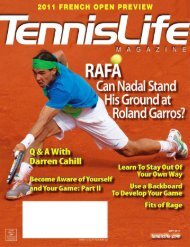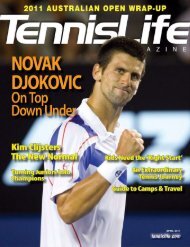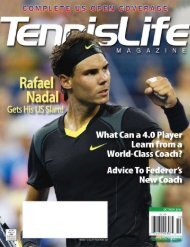A Champion's Mind - Pete Sampras
www.tennismoscow.me Insta:TENNISMOSCOW
www.tennismoscow.me Insta:TENNISMOSCOW
You also want an ePaper? Increase the reach of your titles
YUMPU automatically turns print PDFs into web optimized ePapers that Google loves.
that familiarity made me even more comfortable. And it also hit me that this wasn’t just a major final—it<br />
was the Wimbledon final. The end match at a tournament I grew up watching on TV. I was aware of the<br />
Royal Box, that dark green enclosure where the spectators had a lot more room than the ordinary schmoes,<br />
and sat in wicker armchairs with tan-and-green cushions. The ball echoes on Centre Court in a deeply<br />
satisfying way, because it’s small, close, and partially covered.<br />
From the start, I played well—very well. But it was never easy against Jim, and I had to take care of<br />
my serve and look for my opportunities to break him, which didn’t materialize in the first two sets until<br />
the tiebreakers. In a way, this was the dangerous aspect of grass-court tennis personified. I dominated<br />
with my serve (I had twenty-two aces in the match), and backed it with precise volleys. But solving Jim’s<br />
serve was a far tougher assignment. As we arrived at each tiebreaker, I was well aware that an errant shot<br />
by me here, or a great or lucky shot by him there, would win him the set.<br />
My serve and volley carried me through the first-set tiebreaker. The decisive point of the match<br />
probably was a set point Jim had in the second-set tiebreaker, at 6–5. At that point, I kind of mishit a<br />
volley. It was a strange floater that looked like it was going to sail long and give Jim the set, but it died in<br />
the air and nicked the baseline to tie it up in the breaker, 6–6. Jim was discouraged and I leaped on my<br />
chance, ending the set two points later with a running crosscourt forehand. Later Jim would hit the nail on<br />
the head when he contemplated his missed set-point chance: “It’s just grass-court tennis—roll the dice.”<br />
But even with two sets in hand, the job wasn’t nearly done. In fact, the enormous relief I felt when I<br />
won the second set led to a huge letdown on my part. Serving the second game of the third set, I doublefaulted<br />
on break point and that put a new puff of wind into Jim’s sails. I managed to get the break back, but<br />
I was still drained from all the nervous energy I had expended, and although I was still playing hard and<br />
playing well, I was starting to feel fatigued.<br />
I knew better than to show my fatigue. I needed to keep my shoulders up and squared away. This was<br />
something Tim had worked hard to impress on me in the eighteen months that we’d been working together,<br />
so I pushed myself. I told myself not to dig too deep a hole. But Jim broke me again in the eighth game,<br />
and then he served out the set with an ace.<br />
We battled on serve for five games in the fourth set, and I sensed that I was in trouble. And that’s when<br />
my newfound determination kicked in. A year earlier, I might have wilted in the sun and let the fourth set<br />
slip away and then—who knows? I felt the truth and reality of that possibility in my gut, but I didn’t think<br />
about it. I was always good at shutting out the doubt. I forced myself to fight harder—harder than I ever<br />
had before. I pulled my game together and I broke Jim in the sixth game of the fourth set with another<br />
running forehand pass.<br />
Suddenly I had room to breathe, and I was just two games from the title. Those games went by in a<br />
flurry of aces and winning volleys. And when I converted match point, I felt this surge of joy mixed with<br />
relief. I finally understood what it meant to be a worthy Grand Slam champ. It didn’t matter what anyone<br />
else thought or said, I knew in my own mind that this was the moment when I truly arrived. Up to then, I<br />
had known I could play great matches and win tournaments, even the odd major when everything else fell<br />
into place. But this match wasn’t about merely playing well, it was about legitimizing my character as a<br />
champion.<br />
I’d emerged from the crucible of anxiety and proved my worth. The big difference between this final<br />
and the ones that came before it was that on this occasion, I was fully aware of what was at stake. I set a<br />
pattern that day. In the future, I would take that feeling—that sense of acute anxiety melting away into total<br />
focus and a great sense of liberation when a match finally started—into every critical match I would play.<br />
My win at Wimbledon in 1993 was really the beginning of my career as a dominant champion, although<br />
an incident in the press conference underscored how green I still was, emotionally. The late Princess<br />
Diana had watched me beat Jim, and she had clearly been in my corner as a fan. When the British tabloids<br />
pointed this out and asked for my reaction, I flippantly replied, “Maybe she has a crush on me.” Some of



